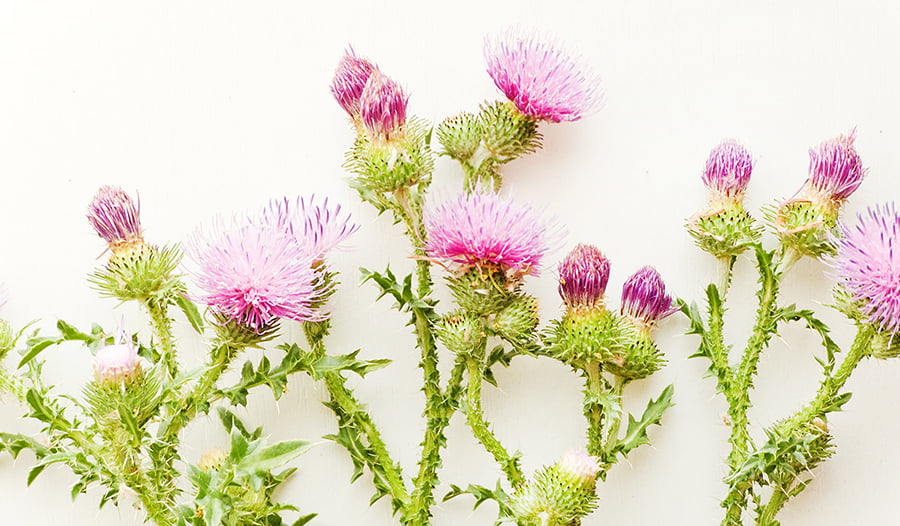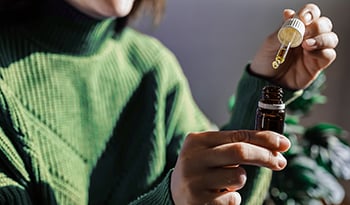Milk Thistle: The Best Supplement to Support Liver Health

What is the Liver’s Role in the Body?
The liver is the largest solid, internal organ in the body. Located in the upper right quadrant of the abdomen, it measures 6 inches in width and weighs roughly 3 pounds. It is no surprise that the liver plays an important role in the body as it is involved in many different essential daily functions.
The liver works with other organs to digest, absorb, and process food. It is involved in the storage of glucose, or sugar, which is used when the body requires more energy. It produces bile, which is a substance that helps to digest fats from food, and absorbs and stores fat-soluble vitamins, including vitamins A, D, and E.
The liver produces substances that are involved in the regulation of blood clot formation and production of red blood cells. Along with the kidneys, the liver is also one of the body’s main organs of detoxification. It metabolizes drugs and alcohol while also working to eliminate harmful substances from the body, including environmental toxins and chemicals. When liver function decreases, it can negatively affect these processes from running efficiently.
Several factors can negatively affect liver function and health. These include excessive alcohol usage, obesity, toxin exposure, certain drugs, and viral infections. Luckily for us, the liver has the greatest capacity to regenerate itself more than any other organ in the body. One particular herb is well known for its liver-protective qualities and health benefits.
What is Milk Thistle?
Milk thistle is one of the most studied and well-known herbs for liver protection and support. Also known by its scientific name, Silybum marianum, milk thistle is an herbal plant that has been used as a supplement for centuries to support liver function. The first use of the plant dates back to the first century where the Greek physician Dioscorides believed the plant contained healing attributes for snake bites. Historically, it has been used as a supplement for ailments of the liver and gallbladder.
Milk thistle is a member of the Asteraceae family, which is a family of plants that also includes sunflowers, ragweed, and daisies. There are over 200 species of milk thistle. Certain species can grow up to six feet tall and bud colorful flowers. Contrary to its name, milk thistle does not come from a cow. In fact, it does not contain any dairy. It gets its name from the white spots on the flower. The stem of the plant also contains a milky sap. The plant is native to southern Europe and also grows in the United States, South America, and Australia.
What Makes Milk Thistle So Useful?
The active ingredient in milk thistle is a plant compound called silymarin, which consists of silybin, or silibinin. Silymarin is found in the seed of the plant. It is believed to have antioxidant properties by increasing glutathione levels.
Glutathione is a powerful antioxidant, produced in the body that helps to fight off free radicals and aids in the detoxification process. Glutathione levels decrease naturally with age and from recurrent toxin exposure. Research has shown that it may help the body by supporting the detoxification process, in which toxins are removed from the body via the liver. Silymarin is also believed to have antioxidant effects that help to support, maintain, and regenerate healthy liver cells.
What Does the Research Say About Milk Thistle?
There have been mixed studies on the use of milk thistle. Some studies have shown milk thistle may provide antioxidant protection to the liver, kidneys, and gastrointestinal tract. Historically, milk thistle has typically been used to address liver conditions, such as viral hepatitis, cirrhosis, and fatty liver.
Cirrhosis is a term that refers to the scarring of the liver. Studies suggest that milk thistle may display anti-inflammatory properties as it may downregulate the inflammatory pathway.
Several studies have shown that the herb may be useful in decreasing liver enzymes that are increased due to viral hepatitis and nonalcoholic fatty liver disease.
A few studies suggest that milk thistle may also be helpful in maintaining healthy cholesterol levels, particularly those with type 2 diabetes, as the liver is responsible for producing and metabolizing cholesterol. Silymarin may have anti-inflammatory health benefits as well.
Silymarin has been used as an antidote for mushroom poisoning. The death cap mushroom, or Amanita mushroom, accounts for 95% of human illnesses from mushrooms. It is widely spread across Europe and can be found in certain areas of the United States and other parts of the world. It releases a toxin called amatoxin, which initially triggers abdominal upset. Over the course of one to three weeks, this toxin can cause liver damage and failure, eventually leading to death, even in the absence of symptoms. Studies have shown that the milk thistle supplement may be effective in patients with Amanita poisoning.
Dosage of Milk Thistle
Milk thistle is generally considered safe for oral consumption. The supplement can be found in capsules, powder, and extracts. The active ingredient amount depends on the method it is prepared. Typically, dosages can vary, but they range from 150–300 mg, taken twice daily. Some people have reported gastrointestinal side effects including nausea, vomiting, and diarrhea. Caution should be taken in anyone with a ragweed allergy. Always consult with a physician before beginning any new health care regimen.
References:
- John Hopkins Medicine. Liver: Anatomy and Functions. 2020. https://www.hopkinsmedicine.org/health/conditions-and-diseases/liver-anatomy-and-functions. Accessed 4/19/2020.
- Siegel, A., Stebbing, J. Milk Thistle: early seeds of potential. Lancet Oncol. 2013 Sep; 14(10): 929-930.https://www.ncbi.nlm.nih.gov/pmc/articles/PMC4116427/. Accessed from PubMed on 4/19/2020.
- de Avelar, C., Pereira, E., de Farias Costa, P., de Jesus, P., de Oliveira, L. Effect of silymarin on biochemical indicators in patients with liver disease: Systematic review with meta-analysis. World J Gastroenterol. 2017 Jul 21; 23(27): 5004-5017.
- Pizzorno, J ND. Glutathione. 2014 Feb; 13(1): 8-12.https://www.ncbi.nlm.nih.gov/pmc/articles/PMC4684116/. Accessed from PubMed on 4/19/2020.
- Aller, R., Izaola, O., Gomez, S., Tafur, C., Gonzalez, G., Berroa, E., Mora, N., Gonzalez. J., de Luis, D. Effect of Silymarin plus Vitamin E in patients with non-alcoholic fatty liver disease. Eur Rev Med Pharmacol Sci. 2015 Aug;19(16):3118-24. https://www.ncbi.nlm.nih.gov/pubmed/26367736. Accessed from PubMed on 4/19/2020.
- Achufusi, T., Patel, R.. Milk Thistle. https://www.ncbi.nlm.nih.gov/books/NBK541075/. Updated 3/27/2020. Accessed from PubMed on 4/19/2020.
- Polachi, N., Bai, G., Li, T., Chu, Y., Wang, X., Li, S., Gu, N., Wu, J., Li, W., Zhang, Y., Zhou, S., Sun, H., Liu, C. Eur J Med Chem. 2016 Nov 10;123:577-595. doi: 10.1016/j.ejmech.2016.07.070. Epub 2016 Jul 29. https://www.ncbi.nlm.nih.gov/pubmed/27517806. Accessed from PubMed on 4/19/2020.
- Ebrahimpour-Koujan, S., Gargari, B., Mobasseri, M., Asghari-Jafarabadi, M. Lower glycemic indices and lipid profile among type 2 diabetes mellitus patients who received novel dose of Silybum marianum (L.) Gaertn (silymarin) extra supplement: a triple-blinded randomized controlled clinical trial. Phytomedicine. 2018 May 15;44:39-44. doi: 10.1016/j.phymed.2018.03.050. Epub 2018 Mar 19.
- Anthony, K., Subramanya, G., Uprichards, S., Hammouda, F., Saleh, M., 2013. Antioxidant and anti-hepatitis c viral activities of commercial milk thistle food supplements. Antioxidants, 2(1): p. 23-36.
- National Center for Complementary and Integrative Health. Milk Thistle. https://www.nccih.nih.gov/health/milk-thistle. Accessed 4/16/2020.
- Tyagi, A., Bhatia, N., Condon, M., Bosland, M., Agarwal, C., Agarwal, R. Antiproliferative and apoptotic effects of silibinin in rat prostate cancer. Prostate. 2002 Nov 1;53(3):211-7. Accessed from PubMed on 4/16/2020.
- Ghorbana, A., Zarvandi, M., Rakshandeh. H.. A randomized controlled trial of a herbal compound for improving metabolic parameters in Diabetic Patients with Uncontrolled Dyslipidemia. Endocr Metab Immune Disord Drug Targets. 2019;19(7):1075-1082. doi: 10.2174/1871530319666190206213420.https://www.ncbi.nlm.nih.gov/pubmed/30727929. Accessed from PubMed on 4/16/2020.
- Ward, J., Kapadia, K., Brush, E., Salhanic, S. Amatoxin Poisoning: Case Reports and Review of Current Therapies. https://www.jem-journal.com/article/S0736-4679(12)00238-7/pdf. Accessed 4/19/2020.
DISCLAIMER:This Wellness Hub does not intend to provide diagnosis...
















































































 Table of Contents
Table of Contents
















